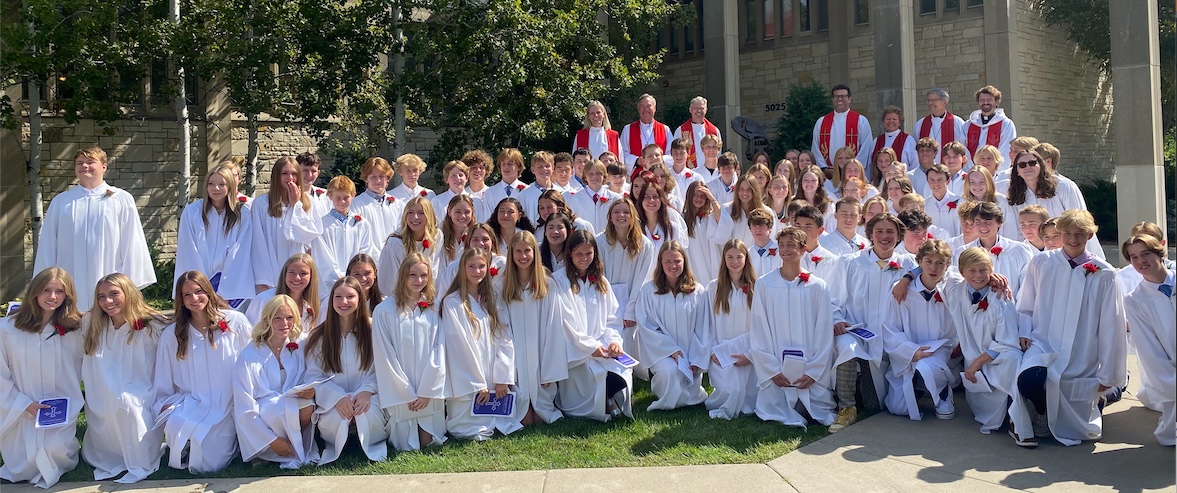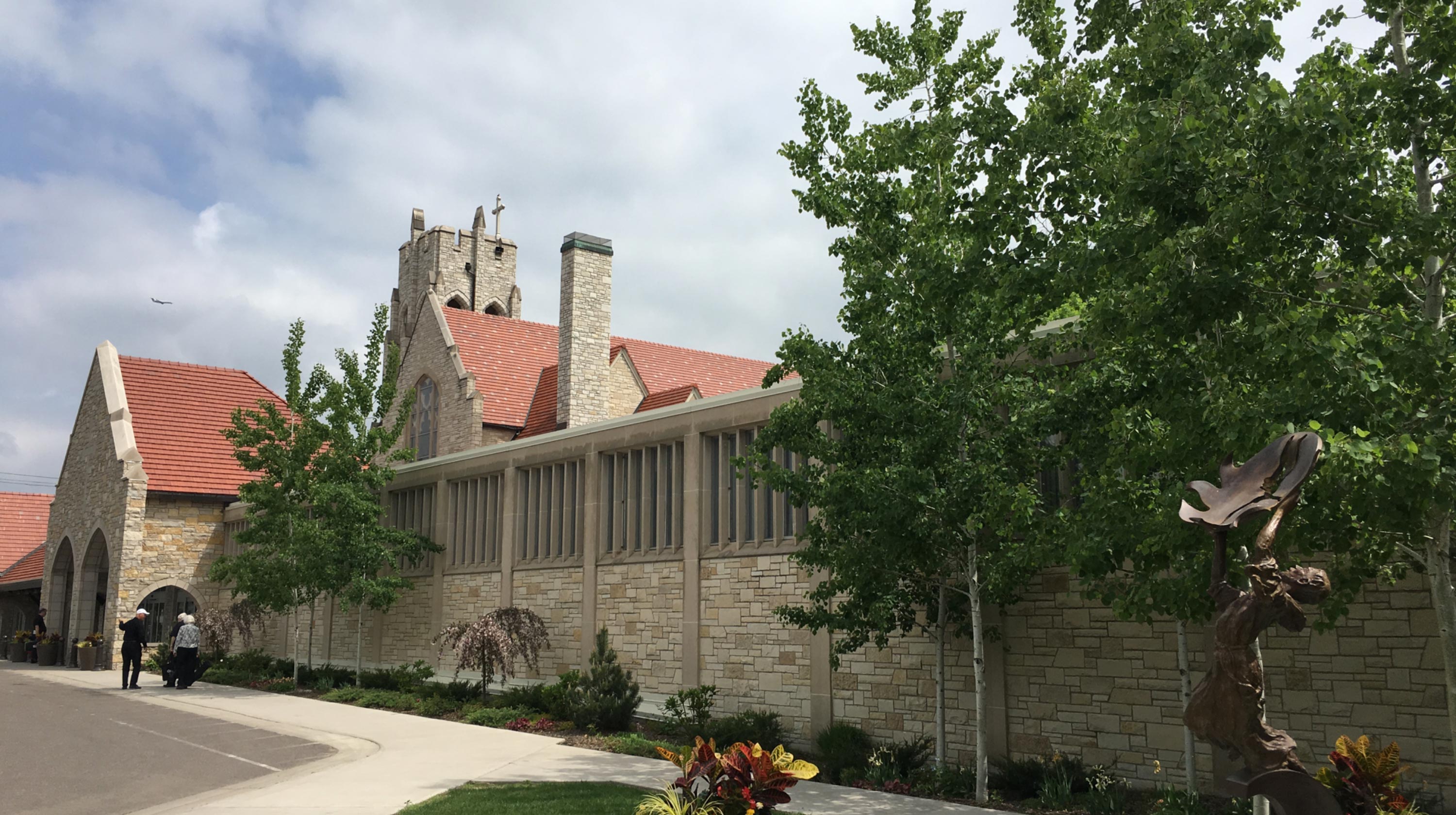
Confirmation
Learning about our faith and forming lifelong friendships.
Make Your Faith Your Own
The Confirmation program at Mount Olivet allows 7th and 8th graders to grow stronger in their faith, which is rooted in their baptismal promises. In Confirmation, your child will learn to read and interpret the Bible and learn more about what it means to live as a Christian according to the Lutheran tradition. They will build important relationships with their peers, Mount Olivet Pastors, Youth Staff, and small group leaders. This is the season of life when their faith really starts to become their own!
Confirmation includes weekly meetings (Mpls and West Wednesdays 7-8pm and Mpls Sundays 8:45-9:45am) as well as an overnight retreat, camping experiences, and the Confirmation worship service (also called the Affirmation of Baptism) at which your child will be officially confirmed. The Confirmation service takes place in September of their 9th grade school year.
If you have questions about Confirmation, please contact, Angie St. Dennis at angelas@mtolivet.org or 612.767.2244 for the Mpls Campus, or Kate Campion at kcampion@mtolivet.org or 952.767.1581 for the West Campus.

Confirmation Schedule
Register for Mpls Campus & West Campus Confirmation
Registration for 7th and 8th Grade Confirmation for 2025-2026 school year is open! Please use the links below to register.
Have questions about registration? Please contact Angie St. Dennis for Mpls Campus Confirmation questions at 612.767.2244 or by email or Kate Campion at 952.767.1581 or by email for West Campus Confirmation questions.
Confirmation Requirements
For our 2025-2026 Confirmation year, these are our expectations.
Our hope is that as a family you would actively worship together on Sunday mornings.
Please print off a PDF of our Worship Notes or electronically, fill it out, and email it to Angie St.Dennis or mail it to Church (see address below). We expect you to do 4 Worship Notes.
We have many service opportunities to get involved with and expect you to do so by getting involved in one, or more, of these options: Chancel Choir, Adopt A Grandparent, Stewardship helper, the Pumpkin Patch, the Food Drive, Sunday morning Nursery helper or helping in a Sunday school class.
Attending our Cathedral of the Pines Camp Confirmation week, the summer going into 9th grade, before you get Confirmed that fall.
Having regular attendance in the confirmation class you registered for and have fun!
The more you get involved in Confirmation the more you will get out of it! For both the student and their family!
Mount Olivet Lutheran Church
C/O Confirmation
5025 Knox Ave S
Minneapolis, MN 55419
Confirmation Overview
By The End Of Their Confirmation Experience At Mount Olivet, We Hope Our Kids Will:
1. Feel more at home at Mount Olivet because they have built deeper relationships with their small group peers, small group leaders, and their pastors;
2. Find the Bible to be more approachable and useful, having practiced reading and applying key stories to their own lives week after week;
3. Discover greater meaning in worship and spiritual practices, and see them as helpful tools for their daily lives;
4. Appreciate more deeply what makes their Lutheran tradition unique and useful, particularly through their engagement with Martin Luther’s Small Catechism;
5. Love Mount Olivet and see a clear and exciting path forward for continued involvement in the life of the church!
Lessons in Confirmation
UNIT 1: LORD’S PRAYER
Prayer is foundational to our relationship with God, but sometimes it’s really hard to know how to pray, what to pray for, and frankly why we should pray. The Lord’s Prayer is a gift from Jesus to help us to know that we are in a relationship with God already and we can come to God with all our needs and wants. This prayer invites us to tell the truth about who we are and know that God will forgive us. It helps us pattern our desires after God’s. Knowing this prayer and practicing it helps us to see the world as God wants us to.
UNIT 2: CHRISTMAS
If you asked 100 people to name a holiday, Christmas might be the top response. And yet, even many people who observe the holiday might miss out on its radical importance. There’s a reason Christmas along with Easter are the holiest days in the Christian calendar. One is the day God became human, entering into this life alongside us. The other is the day God in Jesus triumphed over the death we all experience, securing for all of us life everlasting alongside God. In the midst of all the singing, and gifting, and cookies, it is crucial for us as Christians to remember that the incarnation (literally “God becoming flesh”) is the heart of the holiday. Through the incarnation, we see God’s commitment to share with us all of what it means to be human—joy, sorrow, hunger, thirst, love, and even death. Christmas means nothing we experience is outside of God’s life, love, or care!
UNIT 3: LUTHERAN STUFF
In this unit we will be working to develop some of the most important tools and concepts in the Lutheran theological tradition that help us encounter scripture, and think about life in this world. We will be introducing the doctrine of justification, the distinction between law and gospel, the office of the keys, and vocation. Each of these concepts are built upon the promise that God is the active party, coming to us again and again and promising us that we always belong to God.
UNIT 4: APOSTLES CREED
A statement of belief can sometimes feel restrictive or exclusive. “This is what we believe! No deviations!” It can also feel like a test. “Do you believe these things properly and precisely? If not, trouble.” If we shift our approach, the Apostles’ Creed can function for us less like a theological standard we have to meet in order to belong (or be right!), and more like a comforting statement about who God is and what God does. The Apostles’ Creed is a reminder about the God who creates us, goes to great lengths to be in relationship with us, and continues to draw us into life-giving relationships with each other.
UNIT 6: 10 COMMANDMENTS (1-3)
The first three commandments, sometimes called “the first table,” are all about God’s relationship with us, and our relationship with God. The call of Moses (the “burning bush” story) is at its heart a story about God’s deep and abiding love and concern for God’s people. God saw them, felt their suffering, and recommitted to being their God. We know who God is by what God did for those ancient people and continues to do for us today. Ours is a God who delivers us from evil and provides abundant life–a God who saves. Our relationship is initiated, nurtured, and sustained by God…often despite our wandering.
UNIT 7: 10 COMMANDMENTS (4-10)
Commandments four through ten (or “the second table”) shift our focus from our relationship with God to our relationships with each other. How should we live together? How can we best honor each other as fellow creations of God? How can we build a more trustworthy society? How, in short, can we make this life more like the kingdom of God? These commandments are gifts from God to guide us into a better life here and now, not hurdles for us to clear in order to qualify for life hereafter.